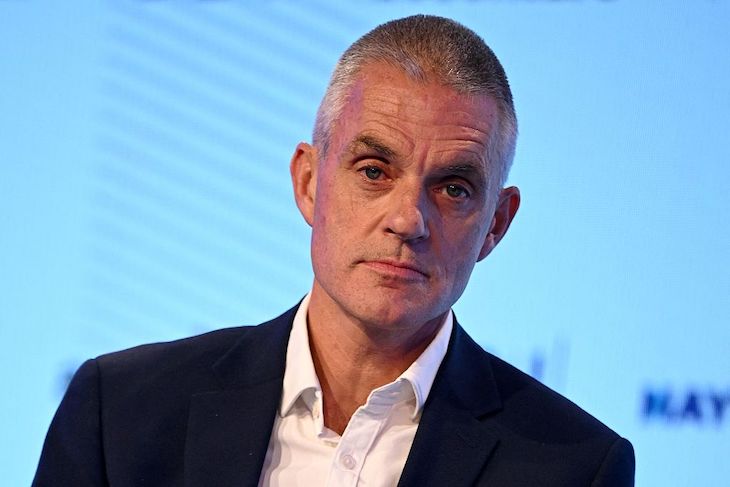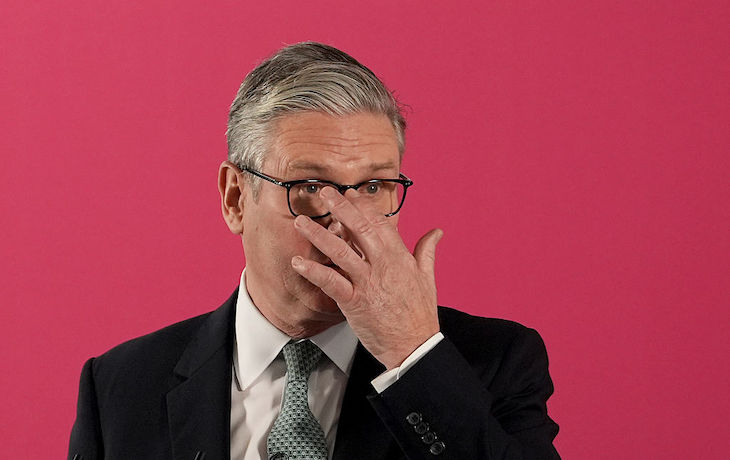Another Director-General bites the dust. And the number two with him. What a facepalm. What a honking, stupid, first-day-in-the office sort of error to make. What cost Tim Davie his job, and presents the BBC with its latest existential crisis, was not just an error: it was an unforced error of the most wince-making kind.
Defenders of the BBC regard this as a confected row, a political hit job, and affect outrage that it cost the top man his job. I’m afraid I don’t think it is
Those of us who, in general, think of the BBC as a good thing – and certainly a much better thing than the various privately-owned alternatives – would like to defend it. We’d like to stick up for the rigour of its journalism and its commitment to objectivity. But it doesn’t half make it hard for us sometimes. All this started when a report by a senior editorial adviser, David Grossman, raised serious concerns about the BBC’s slanted coverage of the US elections; including a doctored quotation in a documentary by one of its flagship current affairs programmes.
Panorama, for those who haven’t been following the story, aired a documentary about the January 6 riots at the US Capitol called Trump: A Second Chance?. In it, they spliced together quotes from two sections of president Trump’s speech to produce a quote that had him say: ‘We’re going to walk down to the Capitol and I’ll be there with you, and we fight. We fight like hell and if you don’t fight like hell, you’re not gonna have a country anymore.’ The problem is that the two sections of that quotation came from parts of the speech that were nearly an hour apart – and omitted the section where Trump enjoined the crowd to protest ‘peacefully and patriotically’.
Rather than receiving Grossman’s rebuke in the spirit of self-examination that we might have hoped for, BBC high-ups were defensive and obfuscating. A follow-up memo by the BBC’s former adviser on standards, Michael Prescott, reported that ‘faced with David’s findings, the Executive refused to accept there had been a breach of standards and doubled down on its defence of Panorama’. One executive, Jonathan Munro, claimed that ‘it’s normal practice to edit speeches into short-form clips’. Prescott described his ‘despair at the inaction by the BBC executive when issues come to light’.
Only when they were embarrassed by the leaking of Prescott’s memo to the Daily Telegraph did Auntie start to go into reverse-ferret mode. Many months late and the proverbial dollar short, the BBC’s chairman Samir Shah was expected to make an apology today, saying that the programme may have ‘unintentionally’ misled its viewers. Misleading it certainly was. Unintentionally so? It’s quite the fit of absence of mind to splice together two quotations from entirely different parts of a speech to make an apparent injunction to peaceful protest a direct incitement to mob violence. Butterfingers! No, ‘unintentionally’ was never going to cut it, and when that became clear Tim Davie and his deputy – honourably, I think – mucked their hands.
The tragedy of this is that it was, as I say, an unforced error. The substance of Panorama’s case– that Donald Trump did a great deal to encourage what turned into a violently insurrectionary assault on the Capitol, and approved of it enough that he went on to pardon the perpetrators – was unarguably correct. They didn’t need to paint the lily with that inane piece of journalistic malpractice. Yet by spicing it up, as I expect they thought they were doing, they made their whole case vulnerable. The White House was able to seize on the leaked report to call it ‘100 per cent fake news’. Five per cent fake news might have been nearer the mark; but you know what they say about a single bad apple.
Defenders of the BBC regard this as a confected row, a political hit job, and affect outrage that it cost the top man his job. But I’m afraid I don’t think it is. Is the BBC held to higher standards than other outlets? It undoubtedly is. Its enemies are watching it like a hawk; and they want to do to it what a hawk does to a fieldmouse. Every editorial misstep in its vast output is pounced on. Its very language is ceaselessly combed for ‘bias’, while the charter commitment to the nebulous notion of balance remains a giant stick to beat it with. Its most fervent opponents are those outlets with vested commercial interests in its destruction, followed in short order by politicians whose reporting it embarrasses.
But all of that is exactly why it cannot afford to play fast and loose with basic journalistic standards. It needs to be better. Sure, this was one distortion in a programme that was substantially on the money. Sure, we see worse day in day out from the outlets that are clambering aboard their high horses to condemn it – the Daily Telegraph just a few months ago was forced to withdraw a prominent story illustrated with stock photographs and based on an interview with somebody who turned out not to exist. But when you have enemies like the BBC has – many of whom, especially those across the pond, are enemies of journalism itself – you can’t go about giving them this sort of ammunition.








Comments